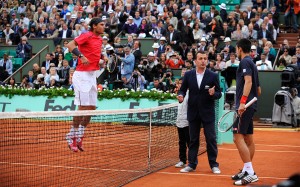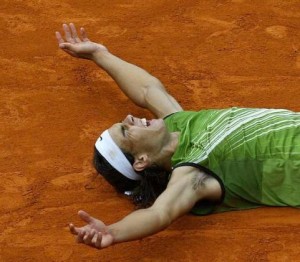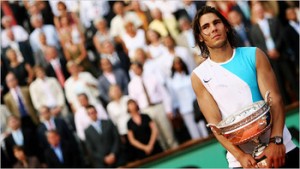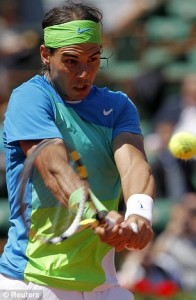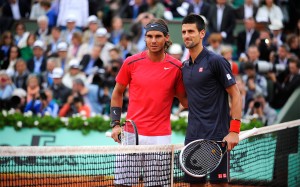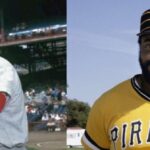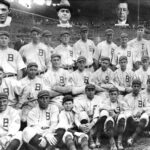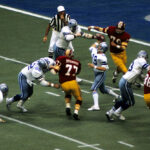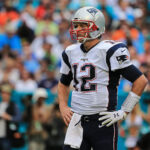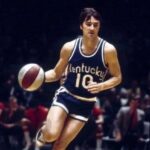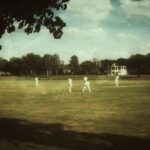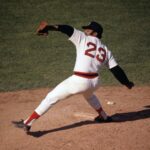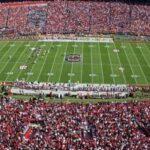The Best Ever: Rafael Nadal Wins His Seventh French Open Title
This year’s French Open men’s champion had much riding on the outcome.
Rafael Nadal entered the grounds of Stade Roland Garros to defend his only Grand Slam title of 2011.
Diminishing Nadal’s tennis aura throughout 2011 was the Serb Novak Djokovic who needed to win this title in Paris to complete his career grand slam—just as Roger Federer attempted in 2006 and 2007 when Nadal turned the great Swiss back, denying him his due.
No other man in the history of the Open Era has dominated a surface more than Rafael Nadal on clay.
Greatest of his achievements on the red clay, however, have come on Court Phillippe Chatrier where Nadal has suffered defeat only once since 2005.
Nadal’s journey to seven Grand Slam titles on the clay has been one of almost total domination starting back when the World No. 2 was a teenager…
French Open 2005
At age 19, after winning clay court tournaments in Rome and Monte Carlo, Rafael Nadal entered the grounds of Stade Roland Garros as the No. 4 seed.
Seeded ahead of Nadal were world No. 1 Roger Federer, American Andy Roddick, seeded 2 and Russian Marat Safin, seeded 3.
2005 marked Nadal’s first French Open with injury keeping out of previous tournaments on the famous red clay that would soon become his favorite and most productive surface.
Nadal defeated Lars Burgsmuller of Germany in the first round, Xavier Malisse of Belgium in the second round and Frenchman Richard Gasquet in the third. The Majorcan did not lose a set until the fourth round when he gave up one set to Frenchman Sebastien Grosjean before moving on to the quarterfinals.
In the quarterfinals Nadal took out Romanian Victor Hanescu in straight sets.
Drawn into Federer’s half of the draw, Nadal faced off against the world No. 1 in the semifinals where he allowed the Swiss one set before dismissing him to move onto the finals.
In the 2005 French Open final, Nadal met and defeated Argentine Mariano Puerta 6-7, 6-3, 6-1, 7-5 to capture his seventh title of the season and his first grand slam crown.
Nadal joined Swede Mats Wilander to win his first French Open on his first try.
French Open 2006
In 2006 Roger Federer entered the French Open with an opportunity to hold all four grand slam titles at one time—just as Novak Djokovic did in 2012.
At the 2006 French Open, Federer was seeded No. 1 and Nadal seeded No. 2. This meant that the two best in the world could not meet until the final, unlike 2005 when they met in the semifinals.
In 2006, the French Open became the first of the Grand Slams to start proceedings on Sunday.
The four top seeds reached the semifinals of the French Open with No. 1 Roger Federer facing No. 3 David Nalbandian and No. 2 Rafael Nadal meeting the No. 4 seed Ivan Ljubicic.
After losing a set to Frenchman Paul Henri Mathieu in the third round and to Aussie Lleyton Hewitt in fourth round, Nadal advanced to the quarterfinals where Serbian Novak Djokovic retired after losing the first two sets. The world No. 2 eased past Ljubicic in straight sets, ready to face Federer on the final Sunday.
The two top seeds traded 6-1 sets with Federer taking the first set and Nadal the second. Nadal was able to close out the match 1-6, 6-1, 6-4, 7-6.
Nadal retained his French Open crown, denying Federer a career grand slam plus the privilege of holding all four slams at one time, becoming only the third man in history to do so.
This would a fate Federer would face time after time trying to defeat Nadal at the French Open.
French Open 2007
Once again Rafael Nadal faced Roger Federer in the final of the 2007 French Open. For the third consecutive year, Nadal left Paris with the championship trophy in tow.
Nadal did not drop a set throughout the tournament until the final when he lost the second set to Federer.
But that hiccup aside, Nadal had his way with all his competition from Juan Martin del Potro in the opening round to Novak Djokovic in the semifinals.
Federer entered as the No. 1 seed but with only a fleeting hope of winning the title from the man whose iron grasp on the Coupe des Mousquetaires seemed unbreakable.
Federer stood on the sidelines watching the only trophy missing from his growing collection of grand slam victories tightly held by the man from Majorca.
The loss represented, just as it had in 2006, the loss of a career grand slam and the opportunity for the world No. 1 to hold all four major championships in one year.
For Federer, the match came down to this—Federer held 17 break points against Nadal and could only convert one.
This explains why the 21-year old Nadal won the event three times consecutively and why he had never been defeated on the red clay of Stade Roland Garros.
French Open 2008
Remember the adage, “If at first you do not succeed, try, try again?”
For Roger Federer, the memory of the 2008 French Open final illustrated that “trying again” meant nothing when playing Spaniard Rafael Nadal during the French Open.
Once again, Federer carefully honed his way to the finals—his third consecutive march to do battle with the man who owned the French Open title for the past three years.
The Swiss must have felt much like Don Quixote, tilting at windmills when the red dust finally settled on that grim Sunday afternoon.
Nadal not only defeated Federer, he did so in straight sets without mercy, embarrassing Federer to the tune of 6-1, 6-3, 6-0.
In fact Nadal did not drop a set during the tournament. Nadal’s final statement to those tempting to dethrone him—this is my province—you stay away!
Lifting the Coupe des Mousquetaires for the fourth year in a row, Nadal was beginning to enter the realm of Borg-dom.
Bjorn Borg had won this trophy six times, four times consecutively.
Four down, two to go to tie, three to surpass the mighty Swede.
French Open 2010
After finally suffering defeat in the fourth round of the French Open Tournament in 2009—losing to Swede Robin Soderling—Rafael Nadal entered the grounds of Stade Roland Garros determined to recapture the French Open trophy in 2010.
In the process Nadal hoped to take back his No. 1 ranking which he held in 2008-2009 and lost back to Federer after the 2009 French Open.
Federer’s hopes of reaching the 2010 French Open finals for the fifth consecutive year were dashed by the same Robin Soderling he had defeated in the finals of the 2009 French Open to gain his first French Open title which allowed the Swiss Maestro a career Grand Slam.
Soderling excused Federer in the quarterfinals of the 2010 French Open, making it the first time Federer had not reached the semifinals of a Grand Slam event since the French Open of 2004.
Soderling would reach the finals for the second consecutive year where he would face Nadal, the man he had defeated in the fourth round in 2009.
Nadal, however, under different conditions in 2010, swept the Swede aside 6-4, 6-2, 6-4.
Nadal won his fifth French Open title and marched through the draw without dropping a set for the second time.
Federer would lose his No. 1 ranking to Nadal at the conclusion of this French Open, falling one week short of matching Pete Sampras’ 286 weeks at No. 1.
French Open 2011
In 2011, there was a new star rising to strike fear in the hearts of the two men who had dominated the action on Court Phillippe Chatrier since 2005.
New world No. 2 Novak Djokovic was riding an amazing winning streak coming into the 2011 French Open.
In fact, Djokovic had not lost a match since the 2010 World Tour Finals in London. The Serb had already passed Federer at Indian Wells, stealing the No. 2 ranking away.
Now Djokovic had his eye on Nadal, hoping to snatch another victory on clay from the vaunted clay master himself.
When the draw came out, Federer found himself on Djokovic’s half of the draw while Andy Murray, world No. 4, was on Nadal’s half.
The four top seeds would meet in the semifinals where Federer ended the Djokovic winning streak one win shy of tying John McEnroe’s 42-match winning streak accumulated in 1984.
Nadal did not sail through his competition as he had in 2010. The world No. 1 found himself extended to five sets in his opening round match against John Isner of the United States.
Once past the Isner encounter, however, Nadal breezed into the final where he faced a newly invigorated Roger Federer.
While Federer had his chances, playing the best match of his life against Nadal on the grounds of Stade Roland Garros, belief kept him down and Nadal was able to win in four sets 7-5, 7-6, 5-7, 6-1.
This meant that Nadal had now tied Bjorn Borg’s six French Open titles.
He needed only one more to pass Borg and forever be regarded as the best ever to play on clay.
French Open 2012.
Even though Nadal managed to win the 2011 French Open title, he could not manage another grand slam title in all of 2011. He lost his No. 1 ranking to Novak Djokovic at the 2011 tournament at Wimbledon.
Nadal lost to Djokovic in finals at both Wimbledon and the US Open, allowing the new world No. 1 to solidly cement his new ranking at the top of the men’s game.
As both men entered the French Open, both had major milestones at stake.
For Djokovic, the opportunity to hold all four majors at one time, plus capturing his career grand slam awaited—if he could win the 2012 French Open.
For Nadal winning the 2012 French Open title meant capturing the title for the seventh time, breaking his tie with Bjorn Borg and hopefully, forever being regarded as the best ever on this surface.
In the semifinals, both men came through in straight sets. Djokovic sent Federer packing with barely a murmur of protest while Nadal beat David Ferrer into submission, as usual.
In the final, it looked as though Nadal would sweep Djokovic aside but the weather and Djokovic’s strong desire intervened and the world No. 1 clawed his way back, taking the third set.
In the fourth set, Djokovic was up by a break of serve when play was suspended as the rain continued. Finally the match was postponed until Monday morning.
Djokovic started proceedings serving with the lead at 2-1. Immediately, Nadal broke back and leveled the match at 2-2. They played to 4-4 with plenty of long rallies.
Rafa extended to 5-4 when rain returned briefly. Djokovic came back to level the match at 5-5.
In the end, Djokovic double-faulted to end the match with Nadal winning his seventh French open title 6-4. 6-3. 2-6. 7-5.
How far will he go on the red clay? Come back in 2013 and see if the great clay court master can win eight French Open title.
